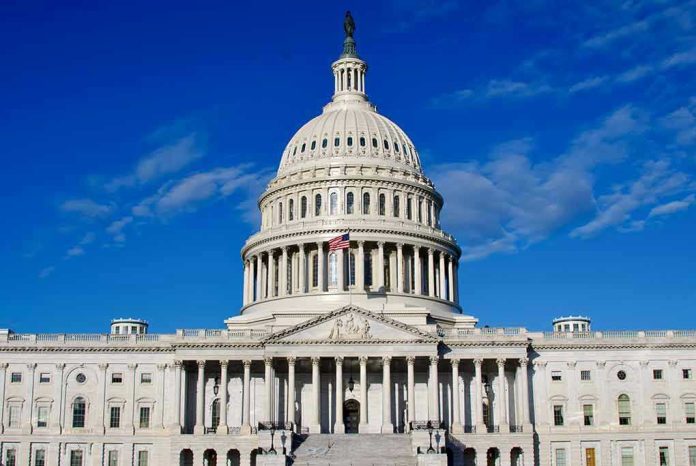
Two words—“Say it to my face!”—flung by Hakeem Jeffries at Donald Trump, have ignited a political firestorm that’s as much about race, technology, and civility as it is about two men locked in a battle for the nation’s narrative.
Story Snapshot
- Hakeem Jeffries confronts Donald Trump directly after a controversial social media video surfaces.
- The clash centers on accusations of racism and the use of AI in political attacks.
- Trump’s video targets Jeffries and Schumer, intensifying partisan animosity on Capitol Hill.
- The episode raises urgent questions about technology, truth, and the boundaries of political discourse.
Jeffries Versus Trump: A Capitol Hill Confrontation
Hakeem Jeffries did not mince words outside the U.S. Capitol, challenging Donald Trump in front of throngs of cameras and reporters. The previous day, Trump had posted a video on social media that mocked Jeffries and Senate Minority Leader Chuck Schumer. Jeffries labeled the video “racist” and cut through the usual Washington fog by demanding that Trump address him directly rather than hiding behind digital provocations. The confrontation marked a rare moment of raw emotion on Capitol Hill, where grievances usually simmer behind closed doors.
This episode signals a shift in the tenor of political engagement. Rather than letting insults fester online, Jeffries opted for direct confrontation, betting that public accountability could shift the conversation. For many watching, it raised the stakes of political dialogue, especially when issues of race and respect are thrown into the national spotlight.
Millions of Americans are on the brink of losing their healthcare and Trump is tweeting racist videos.
Bigotry doesn't solve problems; it only divides us. We will not back down.
The people demand action: cancel the cuts, lower the costs, and protect healthcare, period. https://t.co/GuakZ2nimv— The Black Caucus (@TheBlackCaucus) September 30, 2025
AI, Race, and the Weaponization of Social Media
At the heart of the controversy lies a politically charged video, reportedly generated or manipulated with artificial intelligence, that caricatured both Jeffries and Schumer. Jeffries accused Trump’s post of crossing a moral line, calling the content not only “racist” but also emblematic of a new era in which digital tools can amplify old prejudices with unprecedented reach and speed. The use of AI in political ads and attacks is not new, but the intensity and immediacy of its impact continue to surprise even seasoned observers.
Race remains a volatile issue in American politics, and the layering of technology over old divides makes it harder to discern intent from impact. For Trump’s supporters, the video might read as satire or hardball politics. For Jeffries and many of his allies, it’s a clear escalation—one that leverages the power of digital media to shape perceptions and stoke outrage.
Political Theater or Genuine Outrage?
Critics and commentators alike are split: Was Jeffries’ outburst a calculated piece of political theater, or did it reflect genuine anger at a system that seems increasingly detached from accountability and decorum? The answer may be both. Jeffries, as a high-profile Democrat and a rising star within his party, has much to gain by publicly challenging Trump’s tactics. At the same time, the emotional charge of his response resonated with many who see politics as too often sanitized and distant from the real frustrations of voters.
Trump’s own response, or lack thereof, is also telling. His approach—leveraging social media to provoke reactions and dominate the news cycle—has become a defining feature of American political life. The clash with Jeffries serves as a reminder that for every digital jab, there is a very real human cost, as reputations, trust, and the boundaries of civil discourse are tested.
Technology, Truth, and the Future of Political Discourse
This incident is more than just another viral spat; it is a cautionary tale about the future of political engagement in an age of deepfakes, AI, and rampant misinformation. The line between satire and slander grows ever thinner when technology can manufacture convincing images and words at the push of a button. As Jeffries and Trump spar in the public arena, the broader question looms: How can democracy survive when technology threatens to outpace both our laws and our sense of decency?
For older Americans, many of whom still remember a time when political disputes played out in smoky back rooms rather than on screens, the spectacle is both bewildering and alarming. The values of directness, honesty, and respect that once underpinned public debate are increasingly undermined by a culture of digital one-upmanship. Whether Jeffries’ defiant stand will mark a turning point or simply another headline in the never-ending scroll remains to be seen—but the urgency of the questions it raises cannot be ignored.
Sources:
Trump posts racist, AI-generated video of Schumer and Jeffries ahead of looming government shutdown



